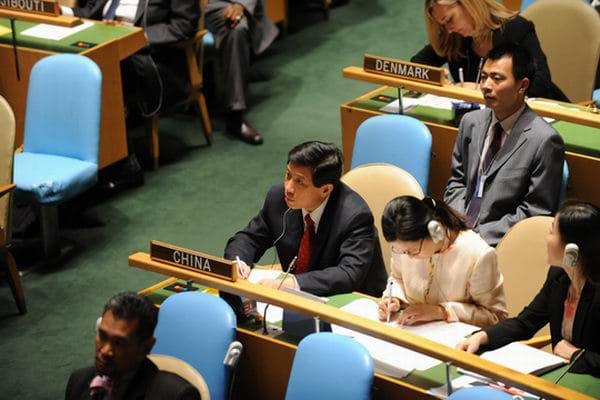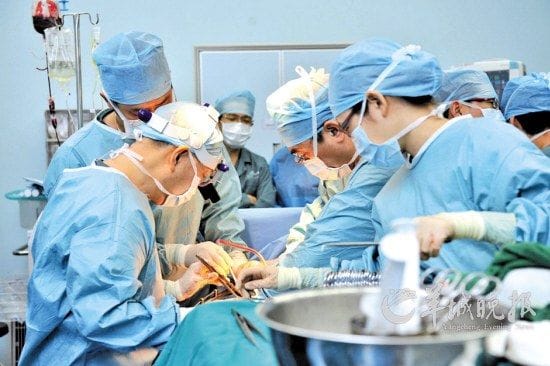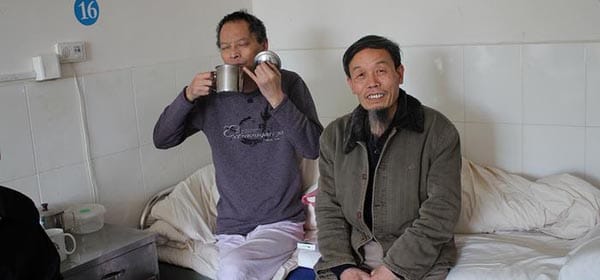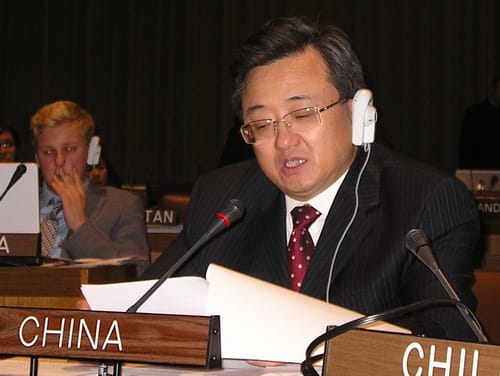
The process is well underway. The troika of countries overseeing the review—Sierra Leone, United Arab Emirates, and Poland—has been selected, and information on China’s human rights record is being compiled by non-governmental organizations, like Dui Hua, UN treaty bodies and working groups, and, of course, China. All members of the United Nations are invited to participate in the interactive dialogue on China’s report to register criticism, acknowledge progress, and submit recommendations that China can either accept or reject.
At the time of China’s first UPR, a number of kinks existed due to the novelty of the exercise. Representatives of countries had to line up to participate in the interactive dialogue and were called according to their places in line. China’s allies were at the front of the queue, some waiting all night to secure their spot. Because time for the dialogue was limited, many countries, mostly those with more critical statements, weren’t able to speak.
China also benefited from the low-key approach adopted by the United States. President Barack Obama had just taken office and his administration had yet to determine its policy towards China. The United States sent relatively junior officers who neither participated in the interactive dialogue nor lodged criticisms or recommendations. The United States, which is a member of the Human Rights Council, is expected to adopt a far more vigorous approach during China’s UPR this October.
Steps Forward, Steps Backward
The number of executions has been sharply reduced but remained around 3,000 per year in 2012Dui Hua
A country’s second UPR is supposed to focus on two things: 1) changes in the country’s human rights situation, and 2) implementation of recommendations the country accepted in its last UPR.
China’s human rights record has shown positive and negative developments since the last review. On the positive side, the number of executions has been sharply reduced, although in 2012 it remained high at around 3,000 per year. The reduction was likely brought about by greater use of the unique Chinese sentence of death with two-year reprieve (which is nearly always commuted to life imprisonment or a fixed-term sentence), improvements in due process rights recently codified in revisions to the Criminal Procedure Law (CPL), continued review by the Supreme People’s Court, and the decision to move away from using executed prisoners as the country’s primary “organ donors.” (According to Vice Health Minister Huang Jiefu, China may end its reliance on executed prisoners as a source of organs in 1-2 years. Executed prisoners account for more than 90 percent of deceased donors.)
The revised CPL that took effect on January 1, 2013, will be critically assessed at the UPR, and a number of positive changes will be highlighted by China and its friends. A section on juvenile cases includes provisions for diversion (which the law refers to as “conditional non-prosecution”) and records sealing—measures that are likely to significantly reduce the number of juveniles incarcerated and improve opportunities for rehabilitative justice. Strictures against torture have been tightened. Decisions to place people under psychiatric detention have been wrested from police and put in the hands of the courts (the National People’s Congress also passed China’s first mental health law in October 2012, a few months after adopting the CPL revisions). Women serving life sentences are permitted to nurse their children outside prison. Suspects must be notified of their right to an attorney during their first interrogation and, in most criminal cases, are required to have access to counsel within 48 hours of their lawyer’s request.

Also expected to be praised are reforms related to reeducation through labor (RTL), a type of custodial “compulsory education” that is imposed without trial for a period of up to four years. In early January 2013, the newly appointed head of the Central Politico-Legal Committee of the Communist Party, Meng Jianzhu, said that, pending approval, RTL will “cease” in 2013. China reported 160,000 RTL detainees in 2009, and by October 2012, a government researcher said the number had dropped to about 60,000. The numbers are not comparable, however, since the latter excludes more than 200,000 people in mandatory drug treatment, which is often conducted inside RTL facilities.
But as is so often the case, there is more to the reforms than meets the eye. Despite reducing the scope of the death penalty, people can still be executed for non-violent and economic crimes like illegal fundraising. Public security bureaus will continue to run their own psychiatric detention hospitals. And even though RTL may be phased out, there are still a number of common ways to detain people without trial.
While some of these means, like mandatory drug treatment and “custody and education” for sex workers, stand outside the criminal law, others have made their way into the revised CPL. In three types of cases—endangering state security, terrorism, and “extremely serious” bribery—suspects can be placed under “non-residential residential surveillance” in places of police choosing for up to six months. They are held incommunicado. Access to counsel is not guaranteed. Families need not be informed of their whereabouts, and, perhaps because of this, family visits are neither assured nor routine. For people suspected in the first two types of cases, police can impose criminal detention for up to 37 days without providing the family with any notification if police believe it would interfere with the investigation. These provisions have become collectively known as the “disappearance clauses.”
Acceptance Foregone
Despite its international obligations and assurances that it would do so, China has yet to implement several of the recommendations it accepted during its first UPR. Three examples certain to draw fire are: 1) ratification of the International Covenant on Civil and Political Rights (ICCPR), 2) stepping up cooperation with the Human Rights Council’s special procedures mandate holders, and 3) facilitating an early visit by the UN high commissioner for human rights.

China rejected recommendations that stipulated a clear ratification deadline but did agree to Austria’s recommendation to ratify the ICCPR. When Chinese representatives signed the covenant on October 5, 1998, they were confident of early ratification. They gave assurances to foreign diplomats that China would ratify in less time than it took the United States, but to make good on its promise, China would need to ratify the covenant no later than June 8, 2013. Moreover, by accepting the recommendation to ratify, China reaffirmed its commitment to take steps towards aligning its law and practice with the covenant. Yet despite some improvements, China has yet to make verdicts and execution statistics public in accordance with Article 14.1. It also recently codified incommunicado detention in excess of 15 days, in contravention of Article 10, and for more than 15 years has held dozens of people in custody for defunct counterrevolutionary crimes, in contravention of Article 15.1.
Despite having 12 pending requests, the oldest dating back more than 10 years, China has only hosted one visit of a rapporteur or other official from the UN Special Procedures Division over the last four years. The special rapporteur on the right to food, Olivier De Schutter, visited China in December 2010. Covering what the Chinese government likely saw as a relatively safe topic, his report lauded achievements in agricultural productivity—in 2005, China went from being a food-aid recipient to a food-aid donor. However, it also critically assessed the forced resettlement of Tibetan herders, a much more controversial issue.

As it did for De Schutter, China had high hopes for Navanethem Pillay, the first UN high commissioner for human rights to hail from a developing country. When the South African took office in September 2008, she declared her intention to spend more time critically examining the rights records of developed countries. During its 2009 UPR, the Chinese delegation welcomed Pillay to visit China at “a time convenient to both sides,” and an invitation to visit China was floated by He Yafei, then Chinese ambassador to the UN stationed in Geneva, in April 2011. Later that year, a seminar on the death penalty was held in Hangzhou, providing an unprecedented example of cooperation between China and the United Nations. Then, before a visit had been scheduled, Pillay began releasing statements critical of China’s rights record that generated significant discord. China’s Ministry of Foreign Affairs was particularly incensed by a statement in November 2012 that called on China to address “deep underlying issues” that have led to self-immolations in Tibet. It rejected the criticisms and made clear to the Office of the High Commissioner for Human Rights (OHCHR) that cooperation would cease unless the “finger pointing” and China “bias” ended.
During her first term, Pillay made country visits to all of the permanent members of the UN Security Council except China. It would be unprecedented for a high commissioner to leave office without visiting China and would not go unnoticed by the OHCHR or any branch of the United Nations system.
Of course, there’s still time for relations to improve. Tentative discussions are underway regarding a possible trip to China by the high commissioner, and Pillay’s mandate does not end until September 1, 2014. In the eight-month countdown to China’s UPR, there may yet be a warming of Sino-UN cooperation and further improvements on key areas like arbitrary detention with the highly anticipated reform of reeducation through labor. ■
2009 UPR Recommendations In its first Universal Periodic Review in 2009, China accepted 42 recommendations and rejected 50. Below are excerpts related to Dui Hua’s focus areas. | |
Accepted | Rejected |
Political and Religious Prisoners | |
Ratify the ICCPR (Austria) | Ratify the ICCPR as soon as possible and bring its legislation into line with its provisions (Netherlands) |
Juvenile Justice | |
Attach more importance to the protection of rights of the child through national plans for economic and social development (Qatar) | N/A |
Women in Prison | |
Continue the efforts aimed at further enhancing the status of women (Mozambique) | Adopt specific legislation on domestic violence (Brazil) |
Capital Punishment | |
In the light of its national realities, continue to implement the policy of strictly controlling and applying the death penalty (Egypt) | Reduce the scope of application of the death penalty, and publish statistics to show that the use of the death penalty is falling in China (UK) |
